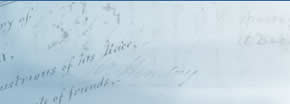| About the transcriptions and text encoding |
 |
|
|
The transcriptions
About
the Text Encoding Initiative (TEI)
Editorial
conventions
The transcriptions were made from the original
documents using the following method:
- Word for word
- Line for line
- Mistake for mistake
- Correction for correction
Where possible, the author’s original symbols
and markings have been copied in the transcriptions. Underlined
text in the documents therefore represents [authorial] underlining
in the original document and not a hypertext link.
Where authorial marks could not be exactly represented
(e.g. double or triple underlining or strikethrough), the closest
alternative has been used.
Key
| [sic] |
the author's spelling |
| [illegible] |
the handwriting is too poor to decipher |
| { } |
the transcriber's best guess at the word or phrase |
| ƒ |
long s as per the author's use |
About the Text Encoding Initiative (TEI)
http://www.tei-c.org/
The transcripts on this website have been marked
up in XML using tags defined by the Text Encoding Initiative
(TEI). The TEI is an international, interdisciplinary standard
for representing literary and linguistic texts for online research.
It allows detailed information and description about any aspect
of the original document to be embedded within the XML document,
thus greatly enhancing its potential for research and its repurposability.
The version used on this website is TEI "Lite"
which contains the basic elements of the encoding initiative.
Among others we have used the following mark-up tags, each of
which have a range of attributes:
- <text>: describes global characteristics
of the text such as language (<text lang="English">)
- <sic>: author's spelling
- <gap>: gap in text or in transcription
e.g. illegible text (<gap reason="illegible">)
- <unclear>: transcriber's best guess
at a word
- <del>: authorial strikethrough
- <add>: authorial insertion
- <hi>: for superscripts, underlines
etc (<hi rend="superscript">)
- <rs>: reference strings e.g. people,
places, vessels, glossaries (<rs type="person">)
- <address>: for describing addresses
(e.g. receiver's address, sender’s address)
Editorial conventions
We have used single inverted commas rather than
italics for ship names in the glossaries and site text.
|
|
| |
 |



